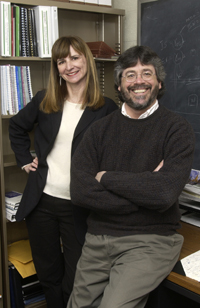|
4:00 p.m., April 11, 2003--Two University of Delaware researchers have received a five-year grant of $1.7 million from the National Institute of Child Health and Human Development (NICHD) to study children at risk for learning difficulties in mathematics.
 |
| UD researchers Nancy Jordan and David Kaplan |
The researchers, Nancy Jordan, associate professor, and David Kaplan, professor, both in the School of Education, will work on the project with teachers and administrators in the Christina School District in New Castle County, Del.
Although many schoolchildren in the United States are failing or underachieving in mathematics and although they rank low compared to students in other Western nations, Jordan said that research on students with mathematics difficulties has lagged far behind that on students with reading difficulties.
“Children with math difficulties are understudied, especially in relation to studies of children with reading disabilities,” Jordan said. “Students with reading disabilities get a lot of help early on, while students with math difficulties can go for years without assistance.”
Mathematics is a vital tool in an increasingly technological society, and Jordan said she fears “we are losing a lot of kids, and that is problematic.”
“We don’t want to leave any child behind in math,” Jordan said.
Kaplan said a key goal of the project is to develop better intervention techniques that can be applied early in a student’s career, before he or she is at risk of failure, because early intervention is a much better way to solve a problem than later remediation.
The UD research team will include graduate and undergraduate students and a Christina teacher cadre in the district’s urban and suburban schools.
The researchers will conduct research beginning with kindergartners as they try to identify precursors that might indicate future math difficulties as well as strengths. They will track the students’ growth through third grade, when Delaware schoolchildren must take a state accountability test.
Jordan said they have found through previous studies that in early elementary school, children with math difficulties who are good readers progress faster in math achievement than do children with both math difficulties and reading difficulties, independent of their intelligence, income level, ethnicity and gender.
By contrast, children with reading difficulties who are good in mathematics and children with both reading and math difficulties progress at about the same rate in reading achievement.
Reading difficulties, regardless of whether they are specific or general in nature, tend to remain stable throughout primary school. Math difficulties, on the other hand, seem to be ameliorated by competence in reading, Jordan said.
She said researchers do not fully understand the impact of instructional intervention on the development of mathematical competencies in children with math difficulties, in part because in primary school most interventions are targeted at reading difficulties rather than math difficulties.
“Although it is tempting to suggest that children with mathematics difficulties only, who have a greater range of competencies than do children with both math and reading difficulties, bypass their relatively circumscribed deficiencies in number fact mastery with calculators or other aids, it may be wiser to provide instruction aimed at fostering calculation fluency, in addition to methods that emphasize problem solving,” she said.
Jordan said that at the end of the five-year project, the researchers hope to be able to understand those students who ultimately fail at math. “We want to learn why and to develop techniques to help those children so we can prevent failure,” she said.
Kaplan said the team, using state-of-the-art statistical methodologies, would like to pinpoint “the optimal intervention times for children and to develop a way to predict how they will do.”
They hope to develop an assessment battery for use in schools, one that will be a tool to identify students at risk of math difficulties.
Kaplan said the researchers hope their findings “will be of value to teachers and students, both in the Christina School District and the state, as well as the larger academic community.”
“What makes this research project interesting is there is a nice balance,” Kaplan said. “We are conducting basic research because there are things we do not know and we are also providing practical information that can help the school district, and also the state, identify key intervention points for children with math difficulties.”
Article by Neil Thomas
Photo by Kathy Flickinger
|

